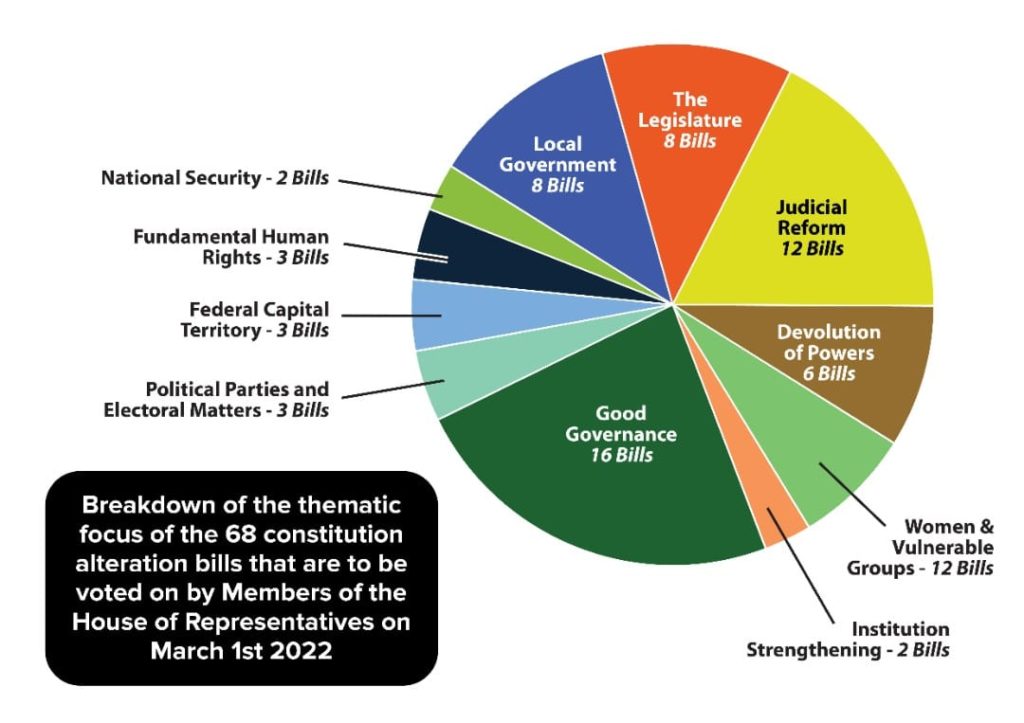There are many Nigerians who hate the 1999 constitution and just want it completely scrapped. This has been their one prayer point for years:
The sentiment is that the constitution is a fraudulent document that was brought to life under unfortunate circumstances and doesn’t fully accommodate the Nigerian experience. For those critics, the 1999 constitution is a malaria drug being used to treat a kidney infection.
Despite agitations for a new “people-driven” constitution, the Nigerian government is not interested in the hard work of compiling a new one from scratch. So, the only middle ground to address the concerns about its inadequacy is to amend it. A constitutional amendment is basically like a home revamp — you want to get an AC to replace the standing fan, get a couple of new throw pillows, and maybe throw a new rug in the centre of the room.
The National Assembly has been in the news a lot over the past week following the constitutional amendment votes of March 1, 2022. Lawmakers in the Senate and House of Representatives voted on 68 bills with issues ranging from restructuring, welfare, to women’s rights. The simple rule of the vote was that each bill must be passed in both chambers. Failure to pass in one chamber was a failure to pass in both.

We’ve already highlighted some of the most impressive bills approved by the lawmakers. Here is a look at their worst decisions.
1. No judicial reform
For context into this particular subject, let us remind you that more than 70% of inmates in Nigerian prisons are awaiting trial. Some of them have been in prison awaiting trial for so long that if they were immediately convicted for their suspected crime, they’d have finished their sentences.
Now let’s play a quick game of Yay or Nay:
Who wants a judicial system that ensures timely dispensation of justice? Now, who wants a constitution that provides timelines within which civil and criminal cases have to be determined at trial to eliminate delay in justice delivery? Also, who wants a system that allows courts to conduct trials remotely, virtually and online with the full aid of modern technology? If you voted Yay for all, then you’re not ready to be a senator.
The House of Representatives voted Yay on all three bills, but the Senate went in the opposite direction and rejected them. Who does judicial reform hurt?
2. No punishment for changing parties
“Cross-carpeting” and “defection” are words that have become popular in political circles in Nigeria because of how much politicians don’t sit down in one place. Many of them switch between the same parties to pursue their personal interests so often that the average politician has been a member of at least two parties. A controversial part of this culture is when elected public office holders abandon a party that helped them win the office and take that advantage to another party.
A bill was introduced to terminate the tenures of such office holders, but it was rejected by the Senate. This doomed the bill even though the House of Representatives passed it. Failure to punish elected officials who fail to take their mandates seriously upholds a culture that allows politicians to do as they please without consequences. It’s not a surprise that the bill didn’t pass because it’s the same people that would be affected by it that made the decision. It’s like expecting goats to vote against guarding yams.
The Nays have it.
3. Voting for torture?
The 1999 constitution prohibits torture and establishes the right to dignity for every Nigerian, but torture enjoys free rein in Nigeria. Security agencies are known to torture and dehumanise Nigerians and get away with it especially because it’s so loosely defined. For lawmakers that claim to care about the wellbeing of Nigerians, closing the loopholes that fuel this culture should be an easy decision.
An alteration bill was introduced to have the constitution clearly define acts that qualify as torture, inhuman or degrading treatment. Both chambers voted against the bill, handing torture specialists in security agencies a lifeline.
4. FCT Minister slot
As the child of circumstance that it is, the Federal Capital Territory (FCT) is not administered by a governor, but a minister that’s appointed by the president. Seven FCT ministers have been appointed since 1999 but none of them is an FCT indigene. There have been campaigns by FCT indigenes to change this, and there has even been a court judgement in their favour.
However, when lawmakers voted on an alteration bill that would make it unconstitutional to appoint an FCT minister that’s not an indigene, the House voted yes, but the Senate voted no.
5. Blocking women
A lot has been said about the performance of gender-based bills voted on by lawmakers on March 1, 2022. We have written extensively about their rejection, and the general attitude of the National Assembly towards gender-based bills will continue to be a blot on its records.
Passing any of the five gender-based bills would have enhanced the inclusion of women in politics, governance and society, but the National Assembly said:

6. No name change for Barkin Ladi LGA
This is a very strange one and we’ll explain why. Of the 68 bills considered, six of them were about changing or correcting the names of some local government areas across the country. Five of them passed, but the one that sought to rename Barkin Ladi local government area of Plateau state to Gwol LGA was rejected by both chambers.
Gwol is the ancestral name of the indigenous people living in the local government area, and they want the name to reflect their identity, not Barkin Ladi which is from the Hausa language. The renaming issue is a subject affected by ethnoreligious sentiment and a similar bill was defeated in 2017.




